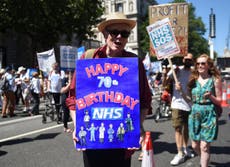Now Harry Leslie Smith is gone, remember above all that he was an ordinary man
There are plenty of people of his generation without Twitter who share his views and his concerns. The right would prefer they didn’t exist because that old stereotype about older people hating the left is very convenient

Nobody expected Harry Leslie Smith to live forever, least of all him. His Twitter handle was @HarrysLastStand; one of his books had the same title, and another was Don’t Let My Past Be Your Future. “With the little time I have remaining on this earth, I plan to teach people that xenophobia only leads to repression and war,” he wrote in one of his articles for The Independent. “On my 95th birthday, I will toast my longevity with a sherry and declare that my last stand as a human being was to not go gently in the good night.”
In another piece written just six months ago, he said: “I cannot sit back in good conscience while the world my generation built is left to turn feral in the hands of right-wing populists and indifferent capitalists… I am a very old man whose only weapon is that I have endured the catastrophic history of the 20th century and I am not afraid to tell younger generations what I saw and experienced in my youth.”
It’s strangely rare to hear someone declare so unequivocally that they’re motivated by their lack of time. In the same clear-eyed, unflinching way that Smith told how his days were numbered, he also told us that the world was going in the wrong direction. He told us he’d seen where populism goes. He told us he feared our compassion was being worn away by years of ruthless moneymaking. He believed the NHS and the welfare state needed to be vigorously defended because they were reaching crisis point. Most importantly, he said these things to the young.
Smith stood against the tide of modern intergenerational warfare. His savvy use of social media certainly helped him reach out to his legion of fans, many of whom were at least 70 years his junior, but it wasn’t the reason why they followed him. In a country where the old are relentlessly pitted against the young – social care costs versus student loans; triple-lock pensions versus taxes on those in work; insular, elderly Brexit voters fearful of immigration versus outward-looking Remainer teenagers being denied the benefits of the EU – he refused to take sides. There is a difference between respecting the past and sentimentalising it, he reminded us. You do my generation no good when you use their experiences as sticks with which to beat the young.
Harry deconstructed what it meant to be patriotic and gave young people who had given up on Britain a reason to love it again. Remember we live in a country with a proud tradition of taking in refugees, he said. Remember the war was about standing up to racism and xenophobia. Remember postwar Britain wanted to forge closer alliances with other countries, especially in Europe. Don’t abandon your country to right-wing rhetoric. Harry wasn’t about to be another ageing war veteran patted on the head by a Farage character in a news snippet while they argued for “Britain striking out on its own”. He was mindful of being used.
We should remember, now Harry Leslie Smith is gone, that he wasn’t unique. There are plenty of older people without Twitter who share his views and his concerns. They go door-knocking for Labour and turn up to Momentum events and speak at working men’s clubs and Women’s Institutes across the country about their experiences. The right would prefer they didn’t exist. That old stereotype about older people hating the left is very convenient to people like Boris Johnson, Liam Fox and Michael Gove: it allows them to position themselves as worldly, sensible, arbiters of “traditional values”.
This is precisely why Smith resisted monikers like “war hero” (which will be no doubt bandied about today, mostly out of love and reverence but still perhaps naively). He didn’t want his generation to be upheld as the gatekeepers of Britain’s values or as extraordinary because they lived through extraordinary times. “We have been conditioned by our politicians, news media and films… to see the history of my generation as momentous and gallant, and those that followed in our wake as feckless and incapable of sacrifice,” he argued, but normal people fight in and live through wars. Normal people have the capacity to do fantastic and terrible things. That’s why normal people have to act now, rather than to wait for an extraordinary leader.
Despite being memorably referred to by a Globe and Mail journalist as “the Ariana Grande of nonagenarian political activists”, Harry was wonderfully normal. He self-published his first books. He recorded his own podcast. He funded speaking tours from his pension. Before the founding of the NHS in 1948, his sister died of tuberculosis in a workhouse because his parents couldn’t pay for a doctor. He is an example of what one normal person can do if they speak with nuance and passion about something they believe in, then act on those words. In remembering him, we should resist the “treacle nostalgia” he found so suspect, and amplify the causes he believed in – precisely because we are normal, and it’s not too late.



Join our commenting forum
Join thought-provoking conversations, follow other Independent readers and see their replies